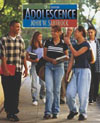|
 |  Adolescence, 9/e John W. Santrock,
University of Texas, Dallas
Culture
Web Links (Referenced in Text Margins)The Web of Culture
(http://www.webofculture.com/)
You can explore many cultures around the world at this web site. Includes information about education and religion in different cultures. |
 |  |  | Cross-Cultural Comparisons
(http://www.fit.edu/CampusLife/clubs-org/sccr)
The web site of the Society for Cross-Cultural Research with articles on cross-cultural research, a cross-cultural newsletter, and links to many web sites with information about cross-cultural comparisons. |
 |  |  | Children, Youth, and Poverty
(http://www.futureofchildren.org/pubs-info2825/pubs-info.htm?doc_id=7214)
This entire issue of The Future of Children is devoted to poverty in childhood and adolescence. You can read the full text of the articles at this web site, including such topics as why so many children and youth are poor, the effects of poverty on children and youth, and intervention programs. |
 |  |  | Poverty in Canada
(http://www.campaign2000.ca/rc)
Examine the extent of poverty in Canada, including information about families and youth. |
 |  |  | Research on Poverty
(http://www.ssc.wisc.edu/irp)
The web site of the Institute for Research on Poverty at the U. of Wisconsin-Madison. Read about how poverty is measured, the extent of poverty in children and youth, sources of information about poverty, and the causes and consequences of poverty. |
 |  |  | Exploring Diversity
(http://www.inform.umd.edu/EdRes/Topic/Diversity)
The diversity database of the University of Maryland will enable you to explore many facets of diversity, including ethnicity, socioeconomic status, gender, and religion. |
 |  |  | Ethnic Groups
(http://wwwlibrary.csustan.edu/lboyer/multicultural/main.htm)
|
 |  |  | Ethnic Groups
(http://www.sciam.com/1998/0998issue/0998numbers.html)
|
 |  |  | Migration and Ethnic Relations
(http://www.ercomer.org/wwwvl/index.html)
An excellent resource for learning more about migration and ethnic relations with links to many related web sites. |
 |  |  | Immigration: Journals and Newsletters
(www.ercomer.org)
Link up with a wide array of journals and newsletter with information about a wide range of topics related to immigration and ethnic groups. |
 |  |  | Immigrant Families
(http://www.futureofchildren.org/search_site2870/search_site_list.htm)
This paper evaluates a number of research and policy issues involving immigration families. |
 |  |  | Ethnic Minority Families
(http://web.missouri.edu/~c539613/ncfrgrps.html)
Read about African-American, Asian American, Native American, Latino, and multicultural families. |
 |  |  | Prejudice
(http://www.socialpsychology.org/social.htm)
|
 |  |  | African-Americans
(http://www.columbia.edu/cu/lweb/eguides/afam/resource.html)
This American Studies web site includes information about many aspects of the lives of African-Americans and their cultural background. |
 |  |  | Asian Americans
(http://www.manaa.org/)
Explore many aspects of the lives of Asian Americans, especially their cultural ties. |
 |  |  | Asian Americans
(http://newton.uor.edu/Departments&Programs/AsianStudiesDept/asianam.html)
Explore many aspects of the lives of Asian Americans, especially their cultural ties. |
 |  |  | Exploring TV Violence
(http://www.aber.ac.uk/media/Sections/tv07.html)
Links to many web sites with information about TV violence can be accessed, including the National Television Violence Study, research reviews, and the Television Violence Monitoring Project. |
 |  |  | Exploring TV Violence
(http://ak.essortment.com/televisionviole_rdni.htm)
Links to many web sites with information about TV violence can be accessed, including the National Television Violence Study, research reviews, and the Television Violence Monitoring Project. |
 |  |  | Children, Youth, Media, and Violence
(http://eric-web.tc.columbia.edu/pathways/youth_violence/nat_vio.html)
Read about such topics as the influence of rock music and videos on young people, sex and violence in prime time, and parenting strategies for stopping media violence. |
 |  |  | Children, Youth, Media, and Violence
(http://www.cln.org/themes/media_violence.html)
Read about such topics as the influence of rock music and videos on young people, sex and violence in prime time, and parenting strategies for stopping media violence. |
 |  |  | Culture and TV Violence
(www.theatlantic.com/atlantic/issues/97may/gerbner.htm)
In this in-depth article, long-time TV violence researcher George Gerber reflects on the damaging effects of TV violence on youth and children. |
 |  |  | Tips for Using the Internet
(http://www.winona.k12.mn.us/wms/training/maryalice/guidelines.html)
Created by Winona Middle School in Winona, Minnesota, this web site has some good strategies for using the Internet. |
 |  |  | Tips for Using the Internet
(http://www.microsoft.com/windowsme/using/internet/tips/default.asp)
Created by Winona Middle School in Winona, Minnesota, this web site has some good strategies for using the Internet. |
 |  |  | Webliography
(http://www.research.umbc.edu/~romary/psychologyweb.htm)
|
 |  |  | Internet Pals
(http://www.epals.com/index.html)
The web site has connections to classrooms from almost 100 countries and 93 different languages. More than 10,000 classrooms and close to one million students are now registered in this classroom exchange program. The connections provide information about what life is like in different countries and the opportunity to communicate with people from different countries. |
 |  |  | Technology and Education
(http://www.aect.org/)
The web site of the Association for Educational Communications and Technology that includes presentation highlights of this organization's most recent convention. |
 |  |  | Educational Technology Journal
(http://www.fromnowon.org)
This web site consists of the journal's most recent issue as well as past issues organized according to topic, such as research, staff development, technology planning, Internet use policies, and assessment. |
 |  |  | Critical Issues in Technology and Education
(http://www.ncrel.org/sdrs/areas/te0cont.htm)
Includes links to information about engaged learning and technology, a planning and implementation guide, building the 21st century school, using technology to support educational reform, The Electronic School Magazine, and many others. |
 |  |  | Technology Standards in Education
(http://www.iste.org/standards)
The web site of the International Society for Technology in Education (ISTE) with extensive information about the National Educational Technology Standards (NETS); includes lots of examples of effective use of technology for learning in the 6th-8th and 9th-12th grades. |
 |  |  | Mediascope
(http://www.mediascope.org/)
This web site provides information about raising awareness about media and society. |
|
|



 2003 McGraw-Hill Higher Education
2003 McGraw-Hill Higher Education